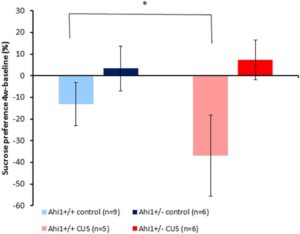A depressive like behavioral state is induced in rodents by exposure to chronic, unpredictable mild stress. This model demonstrates face validity in that exposed animals display signs similar to those of depressed humans, construct validity in that biochemical and cellular changes following CMS resemble similar changes in depressed patients, and predictive validity because the neurobiological and behavioral post CMS changes are effectively reversed by antidepressant drugs. The chronic unpredictable stress procedure has been extensively implemented on both rats and mice.
Ahi1 +/- mice are resilient to the anhedonia induced by the CUS paradigm (reproduced from Wolf et al, 2018). CUS-exposed Ahi1+/+ mice displayed decreased sucrose preference
compared to Ahi1+/+ controls (p < 0.05), but no such difference was demonstrated in CUS-exposed Ahi1+/− mice compared to Ahi1+/− controls. *p < 0.05.
References:
Willner P, Towell A, Sampson D, Sophokleous S, Muscat R. Reduction of sucrose preference by chronic unpredictable mild stress, and its restoration by a tricyclic antidepressant. Psychopharmacology 1987:93:358-364.
Wolf G, Lifschytz T, Ben-Ari H, Tatarskyy P, Merzel TK, Lotan A, Lerer B. Effect of chronic unpredictable stress on mice with developmental under-expression of the Ahi1 gene: behavioral manifestations and neurobiological correlates. Transl Psychiatry. 2018 Jul 2;8(1):124. doi: 10.1038/s41398-018-0171-1.

